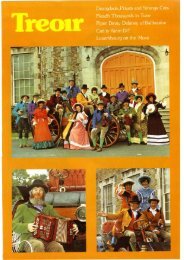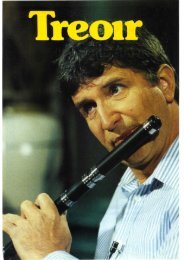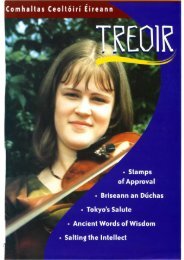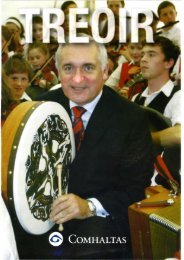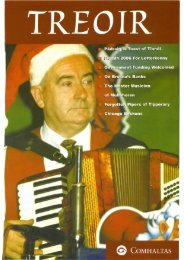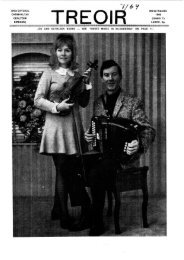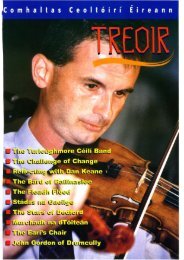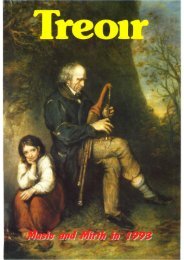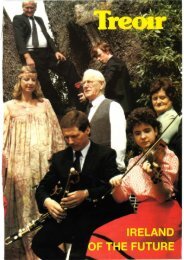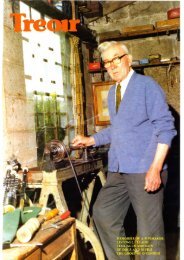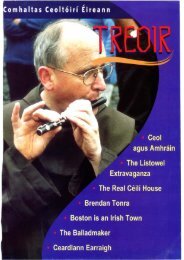ENNIS FLEADH NUA - Comhaltas Archive
ENNIS FLEADH NUA - Comhaltas Archive
ENNIS FLEADH NUA - Comhaltas Archive
- No tags were found...
You also want an ePaper? Increase the reach of your titles
YUMPU automatically turns print PDFs into web optimized ePapers that Google loves.
SOUL SEARCHING MUSICIANSHIPRisteard Donal MacAodhaA compassionate argument can bepresented for the "beat of a differentdrummer" perspective, the view thatmusicians, like all artists, live in anintellectual reality quite diverse fromthe work-a-day world of the office,shop, homemaking situation whereinone must often surrender their soul forthe "objectives" of accumulation andaccomplishment. The fact that one'sinner spirit can be reflected in the externalappearance of an individual can bereadily seen in any culture when onelooks at the dramatist, artist, poet andmusician for their often bright and radicalcolours of dress would indicate thatsomething "different" is going on intheir skulls. The world of art is moreconcerned with the texture of the mistmassaging the granite face outcrop standingsentry over the slow shifting tide ofsheep in the mountains than the price ofthose sheep in the market report. Literally,the left brain of power andaccumulation is a long way from theright brain world of the abstract whereshape, texture and colour reign. Ourworld needs balance and beauty andsome tolerance is hoped for in thosevisionaries who can see and feel thebounce of a jig in a Connemara potholeor the flow of reel in the clift winds offSliabh Liag ..In a world threatened to extinctionwith industrial waste, a school yardmentality in arms proliferation and acallous indifference to world hunger,the fact that music has a universalappeal to reach into the hearts of allages and social classes presents us withan awareness that more, not less, cultureis required in advanced technologicalsocieties. Traditional origins in thecurrent spiralling vortex of alternatives.A society without roots is a ship withouta rudder.Anyone with a love and interest intraditional music should be able torecognize that today as in the past,there is more than an adequate supplyof musical genius who have chosen toenhance this particular form of music.I for one think that we are blessed tohave a musician with the ability,dedication and sensitivity to have ex-celled in any of the classic disciplines,say the concert piano or cello to be dedic.atingtheir lives to their performanceon the tin whistle or fiddle. One problemthat organizations and communitiesoften find with such gifted people isthat they seldom make good teachers,except at the master class level. Theirbrains are so quick that they can seldomcomprehend the average persons "slowness"at grasping the form or shape oftheir presentation. They usually providea far greater service in the form ofinspiration and example than explanation.Their inability to appreciate therelative slowness of a starting studentmight, in fact, discourage a potentiallygood player from continuing on withthe instrument for one of the tragic consequenceswith the gift of lightning fastcomprehension and execution that noamount of practice and dedication canbring about in the average or above averageperson is that the genius is often· intolerantof lesser ability performers.If one has not heard a musical geniuscastigating and belittling the performanceof lesser abiliities in the musicalarena, one has not had very much experiencewith such people. The real tragedyis that such bitterness and backbitinglessens the power of genius anddoes not enhance it for no one on thisuniverse can poison the air around themwithout poisoning themselves, but weshould try to empathize with the plightof the genius. It must be downrightpainful for them to endure the lessermUSICIan playing a semi-tone off,breaking rhythm or corrupting the liltof a piece. The word painful is the "operative"word in this context becauseharm can actually be inflicted by suchbreeches of unity. A master piano technicianwho only works on £20,000 concertinstruments for professional performersonce explained to me that he"cannot" tune uprights for friends orthe needy because it diminishes his standardwhen trying to service the verybest. This fact was confirmed when aclassically trained pianist once confidedshe used to have perfect pitch, but shehad played on so many bad instrumentsthat she lost it. The point here is thatgenius can be diminished and ability canbe lost. It is a gift and a treasure and uslisteners and followers should be protectiveof our best performers and insistthat they have good playing circumstancesand avoid structuring situationswhere they are obliged to play with learnersand aggressive players of varyingstandards and textures. The musicalgenius who belittles his contemporariesis revealing his own insecurity and perhapsa poor upbringing, but the patronwho insists on a performer playing inbad circumstances is equally injuriousand is possibly diminishing a nationaltreasure.This brings up the point of traditionitself for it can be amusing to see thehairs get up on one's back when the discussionof what is and what is not traditionalmusic comes up. Not only havevery strident judgements been made atone time or another against thebodhnins, the "ICB", the piano, theguitar and the post-Planxty generationof Balkan-Grecco fretted stringed instruments,but these same "wrong" instrumentshave also enjoyed their day in thelimelight and there have been genius exponentsof these same offending instrumentswho have raised the consciousnessand appreciation of this source andthereby created "instant" tradition.Even within the tradition of traditionalmaterial, the trend in ornamenting previouslypolished source material resultsin succeeding generations of the sametune being so removed from its originsin texture, speed and lilt that it is hardlyrecognizable to the source. There are alot of good honest players of the 20'sand 30's who, if alive, would hardlyrecognize their compositions played byyoungsters today, particularly if theircompositions happened to have had thesuccess of popUlarity with contemporaryrecording groups. Small's recentradio series, "The Dance Music of Ireland",graphically pointed out howsimple and straight and how beautifulthe original often slower form of thetunes we now consider popularstandards once were. Personally, I don'tthink that there is one "right" answer.Individuals must decjde for themselves43



